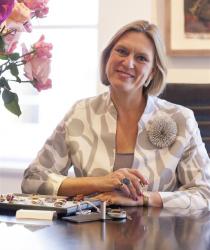
Joanna Hardy’s earliest memories are inextricably linked with making things. “My father was an entrepreneur, whose business involved, amongst many things, petrol stations, slot machines and jukeboxes, but he also found great satisfaction in making things. He could fix anything and as a young girl I would be so impressed with his DIY skills. Every holiday I would work in one of his businesses including being a petrol pump attendant where I became fascinated with cars,” she recalls. “The satisfaction he gained from tinkering in his workshop rubbed off on me as I began to love making things myself. I used to sew endless patchwork squares and I also had the inspiration of a godmother, Margaret Biggs, who was the first woman to be President of the National Association of Goldsmiths and was the first woman to pass the F.G.A gemmology exam with distinction. I remember her grand Georgian house in Farnham very well, full of mineral specimens in ornate cabinets. Art was a big part of life but so was practicality and there was always the expectation that you would work hard at whatever you did.”
An apparent natural for Bedales, Joanna had been put on the waiting list at the school while actually securing a place at Frensham Heights. “My mother, who had been to RADA and was a free-thinking vegetarian with a penchant for yoga, was particularly keen on that type of education for me and when a place at Bedales became free, I went down for the three-day induction with a mixture of excitement and trepidation,” she reflects. “I’d been head girl at my little school in Liphook but I’d gone on to fail my 11+ and my natural confidence had taken a bit of a knock. I also had something of a stutter – reading the lesson at my prep school had been a real dread of mine – and so there were a lot of nerves when I went to Bedales. As it turned out, I loved the induction, got in and had speech therapy at school which helped the stutter to vanish by the time I got to Block 5.”
From her earliest Bedales days in Block Three, Joanna’s focus was predominantly on the creative side of life. “The outdoor work was fun, in my case down at the ferret huts, and the block dances were great social events, but sport, which I loved, wasn’t really emphasised in my day and I used to go to Steep Tennis Club to make up for it. On the other hand, I struggled somewhat on the academic side, partly because I so enjoyed and participated in so many of the school activities. I remember the build up to the Le Mans races, watching Daniel Day-Lewis playing Jesus in the Lupton Hall and smoking behind the bike-sheds with Frieda Hughes! I had to be nudged along academically and it was the workshop that was both my passion and my refuge.”
As with many Bedalians over the years, David Butcher and Martin Box became seminal influences in Joanna’s life. “They were such a great double act,” she says. “David, the father figure with his pipe and his brown overalls, exuding an aura of great calm and making you feel nurtured and looked after, inspired you to give of your absolute best. Martin, six foot something and skinny, was the Mr Cool who hit your student side. You could talk to Martin as an equal and he was entirely non-judgemental, which was enormously important to us. They were both so supportive of all their students; in the workshop, people were there because they wanted to be there and by the time I left Bedales there was no question of me doing anything but following a creative path in life.”
By the time I left Bedales there was no question of me doing anything but following a creative path in life.
Joanna left Bedales in her 6 1 year, whereupon she enrolled at the West Surrey School of Design. “I should have stayed to finish 6 2 but I was keen to experience a new creative path. To an extent, I went into survival mode when I left Bedales,” she says. “I felt a bit scared but the confidence that Bedales had given me was the foundation that allowed me to survive outside the warmth of the Bedales family. I’d won a competition to design an invitation to a student exhibition, for example, which meant so much and endorsed that I had some talent in the field which I wanted to follow in life. Leaving was still a shock to the system, though – you couldn’t link arms with friends any more without people raising their eyebrows – and I realised how wonderful the camaraderie and sharing ethos of Bedales had been and how special the feeling of trust that exists there.”
Before long, Joanna was heading for London to learn how to be a goldsmith at Sir John Cass College in Aldgate East. “Making jewellery with Martin Box had pushed me in that direction and it was he who suggested it to me,” Joanna explains. It was a three-year course, very good technical grounding, but God, it toughened me up! I worked as a Saturday shop girl in Hatton Garden, worked evenings at a hamburger joint, all while I was living in a freezing prefab in Whitechapel long before it became the cool place it is now. It was still the sort of area that the Krays had once run and I became streetwise very quickly.”
By the time Joanna left college, she knew that she loved gems but was unsure of the precise route that she should take through the world of jewellery. Back to Hatton Garden it was, therefore, to learn about the basics of the trade, while she occupied her evenings by studying gemmology. “Those initial days of working full-time in Hatton Garden were vital for me in learning about the industry, the people in it and the workshop,” she remembers. “We were knocking out some awful rubbish at the time, but I was learning while we did so! Eventually I heard about a job vacancy at De Beers, valuing and grading rough diamonds, and although I wasn’t sure who De Beers were at the time, I thought it would be a valuable, and different, next step for me.”
Reality didn’t quite meet Joanna’s expectations. “I was a young girl in a man’s world, all the travelling opportunities were given to the men in the industry back then and De Beers was a giant without competitors in the world of diamonds,” she begins. “If you weren’t with De Beers, you barely counted in the diamond trade and there were a lot of people there who just wanted to hang onto their jobs with the company. It was a really hard place to move up and I realised after a while that I wasn’t going to get anywhere fast. That Bedalian unwillingness to accept authority for its own sake was rearing its head again!”
An advertisement seeking an assistant polished diamond dealer in Antwerp provided Joanna with the impetus that she needed to take her career to another level. “With all its faults, De Beers did give its employees a certain kudos but I felt that I needed to get out, live abroad and learn about polished gems. My new employer felt that as a fairly young woman, I would make a change from the Hasidic Jews who dominated the industry and that I would be guaranteed to get our diamonds in front of clients who were used to a very different type of broker!”
Joanna’s knowledge and experience increased hugely as she accompanied her employee on business trips to places such as Israel and Mumbai and immersed herself in this extraordinary world. “It’s no longer an industry that is dominated by the Hasidim, it’s now a truly international sector in which the Chinese, the Lebanese and the Indians are exceptionally important,” she says. “What hasn’t changed is the idea that your word is your bond. Knowledge is power, yes, but the diamond industry remains one in which, if you’re not tough, honest and fair, you don’t survive.”
By now one of her industry’s acknowledged experts, Joanna moved back to London to join Philips the auctioneers before moving to Sotheby’s in Bond Street and becoming their senior jewellery specialist and auctioneer for fourteen years, responsible for jewellery auctions in New York, Geneva and London. She has subsequently branched out into a wide variety of different areas in which her passion for jewellery has reached a vast audience. Joanna conducts masterclasses and lectures around the world, has published a number of books and is a regular contributor to many international magazines and newspapers, as well as curating contemporary jewellery-selling exhibitions and cropping up on television as the jewellery specialist on the BBC Antiques Roadshow.
The confidence that Bedales had given me was the foundation that allowed me to survive outside the warmth of the Bedales family
“There are still lots of professional ambitions remaining, the wonderful thing about this industry is that you never stop learning. I’ve got a few huge projects planned for next year,” Joanna confides. “One of them will be to take on a paid intern for the first time, which is a really exciting prospect – to have someone next to me who I can share my knowledge with and who can help me with my projects will be wonderful. It’s all about supporting craft and craftsmen for me and eventually, I would love to be able to develop my own product, something tangible, that I could offer to people, as well as maybe find the opportunity to make a TV series on the journey of the gemstone.”
Her old Bedalian self might have been impressed by Joanna’s string of achievements but Joanna herself is convinced that it’s just as likely that she would have been relieved. “I wasn’t ready to leave Bedales and I really was scared about where I would end up,” she says. “Bedales gave me the tools to do what I’ve done with my life and when I meet another Bedalian today, there is always a mutual recognition of someone else who is a little bit different, neither run-of-the-mill nor judgemental but someone who questions authority and has been allowed to develop their talents to the fullest possible extent. I’m so thrilled that Bedales suited my own children so well.”
“Mind you,” Joanna concludes, “if you had told the young me, stammer and all, that I would end up delivering lectures, being an auctioneer and appearing on the telly, she’d have thought that you were having a laugh! I still think that one of my proudest moments ever came on the day that I went back to Bedales and presented a copy of my first book to the school library.”
Joanna Hardy was interviewed by James Fairweather in December 2016.

